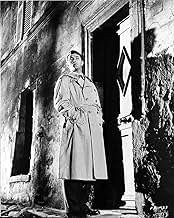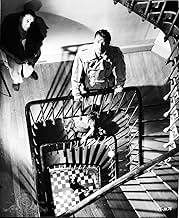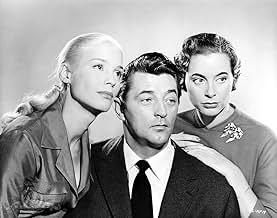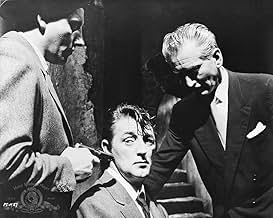CALIFICACIÓN DE IMDb
6.0/10
1.6 k
TU CALIFICACIÓN
Cuando un millonario solitario y enigmático muere repentinamente en la Riviera, su agente de prensa comienza a investigar el turbio pasado de su empleador.Cuando un millonario solitario y enigmático muere repentinamente en la Riviera, su agente de prensa comienza a investigar el turbio pasado de su empleador.Cuando un millonario solitario y enigmático muere repentinamente en la Riviera, su agente de prensa comienza a investigar el turbio pasado de su empleador.
- Dirección
- Guionistas
- Elenco
Ingrid Thulin
- Brita
- (as Ingrid Tulean)
Frédéric O'Brady
- Spring
- (as Frederick O'Brady)
Lily Kann
- Blind Housekeeper
- (as Lilly Kann)
Opiniones destacadas
Foreign Intrigue is as bland and generic as its title. Its scantily credentialed director/writer/producer, Sheldon Reynolds, did an early-1950s TV series with the same name, so this movie looks like a bid for big-screen immortality. Alas, it's one of those polyglot productions that suggests financing flowed from several European countries, with strings attached to several cast members; there's no other way to account for their presence.
A wealthy man of mystery drops dead in his villa on the Riviera. His American press agent (Robert Mitchum) finds him but suspicions grow when he's asked four times in succession if his employer `said anything' before he died. So Mitchum sets out to discover who the man was and how he accumulated his fortune. He starts with the merry widow (Genevieve Page) and travels on to Vienna and Stockholm, where he falls for the daughter (Ingrid Thulin) of a deceased industrialist whom may have been a blackmail target. Mitchum finds that he, too, is being followed....
Foreign Intrigue brings to mind Orson Welles' Mr. Arkadin of the previous year, memories of which emphatically ought not to be freshened. There's little true suspense, though the score, by Paul Durand and Charlie Norman, insists that yes, there is. Reynolds tosses in a little Alfred Hitchock here, a little Carol Reed there, but to little avail. About three-quarters of the way through, the picture reaches a lugubrious crescendo by revealing a vast global conspiracy harking back to the Third Reich. The only sensible reaction to all this is Mitchum's, who knew a good paycheck when he saw one and saunters through the movie with his eyes half-shut, as only he could do. Even so, he remains the only reason to sit through this foreign travelogue devoid of intrigue.
A wealthy man of mystery drops dead in his villa on the Riviera. His American press agent (Robert Mitchum) finds him but suspicions grow when he's asked four times in succession if his employer `said anything' before he died. So Mitchum sets out to discover who the man was and how he accumulated his fortune. He starts with the merry widow (Genevieve Page) and travels on to Vienna and Stockholm, where he falls for the daughter (Ingrid Thulin) of a deceased industrialist whom may have been a blackmail target. Mitchum finds that he, too, is being followed....
Foreign Intrigue brings to mind Orson Welles' Mr. Arkadin of the previous year, memories of which emphatically ought not to be freshened. There's little true suspense, though the score, by Paul Durand and Charlie Norman, insists that yes, there is. Reynolds tosses in a little Alfred Hitchock here, a little Carol Reed there, but to little avail. About three-quarters of the way through, the picture reaches a lugubrious crescendo by revealing a vast global conspiracy harking back to the Third Reich. The only sensible reaction to all this is Mitchum's, who knew a good paycheck when he saw one and saunters through the movie with his eyes half-shut, as only he could do. Even so, he remains the only reason to sit through this foreign travelogue devoid of intrigue.
In order to review this movie, you need to put yourself back into the 50s when it was made. WW2 was just a decade before (closer than Desert Storm is to us), and the cold war was raging. Tales of spies, traitors, and exotic locations were just the ticket for mid-50s audiences. FOREIGN INTRIGUE has plenty of interesting turns and surprises, but it seems to be trying too hard to mix THIRD MAN with MR ARKADIN and perhaps a bit of WW2 Hitchcock (Sabotage, Foreign Correspondent?). I'm not a big Mitchum fan, but he gives his usual looming, low-key performance, and the supporting players do well. My real reason for watching this film (and I've been waiting over 30 years to catch it) is to see Frederick O'Brady, who plays the heavy (he was reviewed at the time as "out-Lorrying Peter Lorre."). He was my French teacher in 1973-74 at the Eastman School of Music and a great raconteur. He had enormous talent in music, languages, writing, and of course acting (having worked with Orson Welles in ARKADIN, plus Jean Renoir, Roger Vadim, and others). If you can find his autobiography ALL TOLD, you'll be fascinated. He told us that Mitchum tried to teach him to drive during the making of this movie, resulting in a wrecked car. Some thought this would be O'Brady's ticket to Hollywood, but instead French directors dropped him, assuming he would be asking too much money for "lowly" French pictures. He spent many years on stage and never had another juicy film part like "Spring" in this picture. If you enjoy the spy genre and aren't in a big hurry for lots of blazing action, find this movie!
The musical score almost makes it unwatchable. The same transition music throughout the film consists of a tom-tom and Gilligan knocking on a coconut with two wooden dowels. It's enough to cause a coma. That being said, the rest of the film's attributes out-weigh the migraine-inducing music.
Mitchum is classic, using his debonair best to woo admirers of his old-school, Hitchcockian style. (Wonder why Hitchcock never really used him?)
The cinematography uses the 1956 color like an oil painting, still incorporating the contrast and shadows of a black and white noir classic.
It's worth a watch.
Mitchum is classic, using his debonair best to woo admirers of his old-school, Hitchcockian style. (Wonder why Hitchcock never really used him?)
The cinematography uses the 1956 color like an oil painting, still incorporating the contrast and shadows of a black and white noir classic.
It's worth a watch.
Foreign Intrigue (1956)
An underrated transition film, a low budget affair that is pure European color and style. Visually, it almost presages the Euro-American "Charade" which was decidedly more up budget. Here, the director, an unknown Sheldon Reynolds, takes advantage of all the empty spaces and long pauses the pace required. The lighting is flat, almost anti-noir, with widescreen grandness and yet an oddly impersonal intimacy. Not to be contradictory--the scenes are generally quiet, with close conversations, but everything is filmed from a certain, and constant, distance.
It is this steady, quiet pace that makes the film work. And Robert Mitchum. He needs no explanation. The first of the two or three main women he connects with is a bit false, but the main one is a caricature of the Nordic beauty, and with sincere energy and charm. At times it really does look like she is smiling at Mitchum, not his character, as if she can't believe she's touring Stockholm, etc., with this famous man, and the movie gets away with it. Mitchum for his part keeps his cool, except for the necessary fist fight once or twice.
It's 1956, and international intrigues like this are slowly rising into a genre of their own. People come and go, scenes are not what they seem at first, people have false identities and foreign accents. The big theme (too big to believe, but that's okay, it's supposed to be) is that realignment of global power after WWII. The real thing, made up of shadowy individuals who seem to be above nationality, and only know about intrigue, money, and winning at any cost.
I don't want to pump this up too much. It's slow at times, and the acting not always right on. The effects (the atmosphere, the fights, etc) are sometimes so archly false you can't quite accept it even as theatrical, but just a cheap. But that's the exception. Fall into the pace of it and it's not bad at all.
An underrated transition film, a low budget affair that is pure European color and style. Visually, it almost presages the Euro-American "Charade" which was decidedly more up budget. Here, the director, an unknown Sheldon Reynolds, takes advantage of all the empty spaces and long pauses the pace required. The lighting is flat, almost anti-noir, with widescreen grandness and yet an oddly impersonal intimacy. Not to be contradictory--the scenes are generally quiet, with close conversations, but everything is filmed from a certain, and constant, distance.
It is this steady, quiet pace that makes the film work. And Robert Mitchum. He needs no explanation. The first of the two or three main women he connects with is a bit false, but the main one is a caricature of the Nordic beauty, and with sincere energy and charm. At times it really does look like she is smiling at Mitchum, not his character, as if she can't believe she's touring Stockholm, etc., with this famous man, and the movie gets away with it. Mitchum for his part keeps his cool, except for the necessary fist fight once or twice.
It's 1956, and international intrigues like this are slowly rising into a genre of their own. People come and go, scenes are not what they seem at first, people have false identities and foreign accents. The big theme (too big to believe, but that's okay, it's supposed to be) is that realignment of global power after WWII. The real thing, made up of shadowy individuals who seem to be above nationality, and only know about intrigue, money, and winning at any cost.
I don't want to pump this up too much. It's slow at times, and the acting not always right on. The effects (the atmosphere, the fights, etc) are sometimes so archly false you can't quite accept it even as theatrical, but just a cheap. But that's the exception. Fall into the pace of it and it's not bad at all.
This is my idea, as a writer, of a great ethical mystery. The intelligent narrative tells the story of an American working for a mysterious and very wealthy man named Victor Danemore. One day at his estate on the French Riviera, the great man, played by Jean Galland, dies. Robert Mitchum as Dave, the assistant, goes to the man's wife, lovely Genevive Page, for information; she knows nothing either. His odyssey to try to find out what he needs to know about his mysterious employer leads him to Vienna and to Stockholm--and finally to the fact that Danemore had been blackmailing Nazi collaborators who were afraid their wartime crimes would be discovered. At the end, having been saved narrowly from the bad guys, who are actually good guys testing his ethics, he goes off to seek out the real ex-Nazi collaborator bad guys in as many countries as he must; by then the lovely young woman he has fallen in love with, Ingrid Thulin (brilliant as always) is going to be waiting for him. This is a project conceived by Sheldon Reynolds, who wrote the script along with Gene Levitt and Harold Jack Bloom and also directed this fascinating movie. He was also the mind behind another Euro-American on-location project, "Dateline:Europe", one of the best half-hour TV series of all time,one which utilized (as this feature movie) does European technicians, actors, locations and artists. (When people talk about " the sorts of movies 'they' used to make and don't or can't any more", this is the sort of international, intelligent, adult and well-scripted film to which the disappointed are referring). The music here by Paul Durand is good, the cinematography by Bertil Palmgren frequently stunning. The piece also has many actors in small but telling parts, including Inga Tingblad as Thulin's mother, George Hubert, Frederick Schreidler, etc. They are all professional and exactly right for their parts; and all the parts contribute to a whole that moves with the inexorability of a tide toward a satisfying climax and an unforgettable ending. A personal favorite.
¿Sabías que…?
- TriviaAround 53 minutes into the film on the veranda in a romantic scene with a beautiful Swedish woman, a rather large bee flies into the scene and flies right between them. They don't break and the bee flies away.
- ErroresAt about 7 minutes into the movie Mitchum is talking to Paige who is sunning herself at the pool. She tells him to throw her robe to her but when she puts it on, she is actually wearing a patchwork dress.
- Citas
Dave Bishop: Did you ever ask him who he really was?
Dominique: No.
Dave Bishop: Women are supposed to be curious... especially wives.
Dominique: Press agents are supposed to be curious.
Dave Bishop: I wasn't married to him.
Dominique: Except for the ceremony, neither was I.
- ConexionesFollows Foreign Intrigue (1951)
- Bandas sonorasFOREIGN INTRIGUE CONCERTO
Music by Charlie Norman
Selecciones populares
Inicia sesión para calificar y agrega a la lista de videos para obtener recomendaciones personalizadas
- How long is Foreign Intrigue?Con tecnología de Alexa
Detalles
- Fecha de lanzamiento
- País de origen
- Sitio oficial
- Idiomas
- También se conoce como
- Die fünfte Kolonne
- Locaciones de filmación
- Productoras
- Ver más créditos de la compañía en IMDbPro
Taquilla
- Presupuesto
- USD 625,000 (estimado)
- Tiempo de ejecución
- 1h 40min(100 min)
- Relación de aspecto
- 1.85 : 1
Contribuir a esta página
Sugiere una edición o agrega el contenido que falta









































